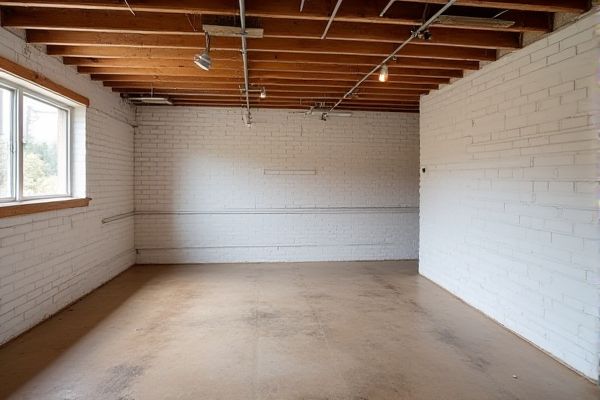
Brick walls provide unparalleled durability and moisture resistance in basement environments, making them an excellent choice for long-term structural integrity. Shiplap walls offer a stylish, textured aesthetic that enhances your basement's visual appeal and versatility; discover which option best suits Your space by exploring the rest of this article.
Table of Comparison
| Feature | Brick Wall Basement | Shiplap Wall Basement |
|---|---|---|
| Material | Clay bricks and mortar | Wooden planks with overlapping edges |
| Durability | High resistance to wear, moisture, and pests | Moderate; susceptible to moisture damage unless treated |
| Insulation | Good thermal mass, but low insulation without added layers | Better natural insulation due to wood properties |
| Moisture Resistance | Generally resistant if properly sealed and maintained | Requires sealing and ventilation to prevent rot and mold |
| Installation Complexity | Labor-intensive and requires skilled masonry work | Easier and faster installation, DIY-friendly |
| Cost | Higher initial cost due to materials and labor | Lower cost, affordable materials and installation |
| Aesthetic Appeal | Classic, solid, traditional look | Rustic, warm, and contemporary appearance |
| Maintenance | Low maintenance; occasional repointing needed | Regular sealing and inspection required |
| Structural Support | Load-bearing capable | Non-load bearing; decorative or partition use |
Brick Wall vs Shiplap Wall: An Overview
Brick walls in basements offer superior durability, moisture resistance, and structural support, ideal for long-term stability in below-ground environments. Shiplap walls provide a stylish, easy-to-install option with better aesthetics and flexibility but require proper sealing to prevent moisture damage. Choosing between brick and shiplap depends on balancing the need for strength and moisture control against design preferences and maintenance requirements.
Aesthetic Appeal: Classic Brick or Rustic Shiplap?
Classic brick walls in basements offer a timeless, industrial aesthetic with rich textures and natural color variations that enhance character and durability. Rustic shiplap walls provide a warm, cozy feel with horizontal wood panels that introduce a farmhouse charm and versatility in paint or stain finishes. Your choice between brick and shiplap impacts the overall ambiance, blending heritage with modern comfort based on the desired style and maintenance preferences.
Installation Process: Which Wall Is Easier to Build?
Brick walls require skilled labor, mortar mixing, and precise bricklaying, making the installation process labor-intensive and time-consuming. Shiplap walls consist of overlapping wooden boards that are easier to cut, align, and fasten, allowing for quicker installation with basic carpentry skills. For basement finishing, shiplap walls offer a more straightforward and efficient build compared to the complexity of constructing a brick wall.
Cost Comparison: Brick Wall vs Shiplap Wall
Brick walls typically incur higher costs due to the price of materials like clay bricks and mortar, along with labor-intensive installation processes. Shiplap walls offer a more budget-friendly alternative, utilizing affordable wood planks that are easier and quicker to install, reducing both material and labor expenses. Overall, shiplap walls provide a cost-effective solution for basement finishing compared to brick walls.
Durability and Maintenance Considerations
Brick walls offer superior durability in basements due to their resistance to moisture, fire, and pests, making them a long-lasting option with minimal maintenance. Shiplap walls, while easier to install and providing a stylish appearance, require regular sealing and may be prone to water damage and mold growth in damp basement conditions. Choosing brick enhances structural integrity and reduces long-term upkeep costs, whereas shiplap demands more frequent inspections and upkeep to maintain its appearance and function.
Insulation and Energy Efficiency Factors
Brick walls in basements provide strong thermal mass, helping to regulate indoor temperatures by absorbing and slowly releasing heat, but often require additional insulation to prevent heat loss. Shiplap walls, typically made from wood, offer better natural insulation properties and can be combined easily with modern insulation materials, enhancing your basement's overall energy efficiency. Choosing shiplap walls allows for simpler installation of insulation layers, reducing energy costs and improving moisture control compared to solid brick walls.
Moisture Resistance: Best Choice for Basements
Brick walls provide superior moisture resistance for basements due to their dense, non-porous nature, which effectively prevents water infiltration and reduces dampness. Shiplap walls, made of overlapping wooden boards, are more susceptible to moisture absorption and can warp or rot in humid basement environments. For your basement, brick walls are the best choice to maintain a dry, durable foundation with minimal moisture-related issues.
Acoustic Performance: Soundproofing Capabilities
Brick walls provide superior acoustic performance in basements due to their dense and solid structure, effectively reducing sound transmission and enhancing soundproofing capabilities. Shiplap walls, made of thinner wooden boards with gaps, offer less sound insulation, allowing more noise to pass through. Your choice between these materials will significantly impact the basement's noise control and overall acoustic comfort.
Design Flexibility and Customization Options
Brick walls in basements offer limited design flexibility due to their rigid structure and fixed pattern, but they provide a classic, timeless aesthetic ideal for traditional or industrial styles. Shiplap walls provide extensive customization options, allowing for varied paint colors, stains, and orientations (horizontal, vertical, or diagonal) that enhance modern, rustic, or coastal interior designs. The ability to easily alter or update shiplap surfaces gives homeowners greater control over the basement's overall ambiance and style evolution.
Which Fits Your Basement: Final Verdict
Brick walls offer superior durability and moisture resistance, making them ideal for basements prone to dampness or structural concerns. Shiplap walls provide a stylish, easy-to-install option that enhances aesthetic appeal but may require additional waterproofing and maintenance in basement environments. Choose brick for long-term strength and moisture control, or opt for shiplap if design flexibility and a cozy atmosphere are your primary goals.
 homyna.com
homyna.com